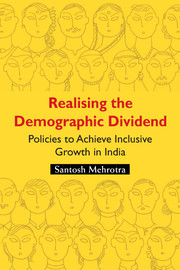Book contents
- Frontmatter
- Contents
- List of Tables and Figures
- Preface
- Acknowledgements
- Part 1 Growth, Employment and Inclusion
- Part 2 Human Capital Formation
- Chapter 8 Addressing Capability Deprivation of Women for Inclusive Growth
- Chapter 9 From the Right to Education to the Right to Learning
- Chapter 10 Food Security, Nutrition and Health: Policy Dilemmas and Interlinked Challenges
- Chapter 11 Redesigning Sanitation Programmes to Make India Free from Open Defaecation
- Part 3 Building a System of Social Protection
- Part 4 Governance
- Index
Chapter 11 - Redesigning Sanitation Programmes to Make India Free from Open Defaecation
from Part 2 - Human Capital Formation
Published online by Cambridge University Press: 05 June 2016
- Frontmatter
- Contents
- List of Tables and Figures
- Preface
- Acknowledgements
- Part 1 Growth, Employment and Inclusion
- Part 2 Human Capital Formation
- Chapter 8 Addressing Capability Deprivation of Women for Inclusive Growth
- Chapter 9 From the Right to Education to the Right to Learning
- Chapter 10 Food Security, Nutrition and Health: Policy Dilemmas and Interlinked Challenges
- Chapter 11 Redesigning Sanitation Programmes to Make India Free from Open Defaecation
- Part 3 Building a System of Social Protection
- Part 4 Governance
- Index
Summary
Although open defaecation is a global problem it is much more serious in India as approximately 60 per cent of the world's population that defaecates in the open lives in India (WHO, UNICEF, 2012). Even worse, a World Bank study revealed that in five states only 67 per cent of the toilets in the villages that have received the Open Defaecation Free (ODF) prize (called Nirmal Gram Puraskar) were being used, and this percentage was lower (46 per cent) in non-ODF villages.
A decade ago in 2002 the Government of India had indicated that less than 20 per cent of India's population in the rural areas have access to proper hygiene although since the mid-1980s the country has had a well established government-funded sanitation programme offering subsidies for individual and community households. Yet at the same time, India has more phone users (around 54 per cent households) and television access (33 per cent) in rural areas than people with access to tap water (31 per cent) and toilet facilities (31 per cent), according to Census 2011. This clearly indicates the failure of government programmes to change a centuries-old practice of defaecation in the open, and hence the lack of demand for toilets.
The chapter is organised as follows. Section 11.1 presents the empirical evidence on the relationship between safe sanitation on the one hand, and nutritional, health and educational outcomes. Section 11.2 examines the current state of India's sanitation problem. Section 11.3 discusses the various government sanitation programmes historically and why they have been less than successful. Section 11.4 analyses the lessons to be learnt from international experiences and section 11.5 discusses the way forward to improve India's sanitation.
Sanitation and its Impact on Nutritional and Health Status: The Conceptual Framework
Lack of sanitation, defined as the improper management (toilets, conveyance and treatment systems) of human excreta, solid waste and drainage, has substantial health effects. As seen in Figure 11.1, open defaecation affects even those who have household latrines on account of the negative externalities caused by the defaecated area in that locality.
- Type
- Chapter
- Information
- Realising the Demographic DividendPolicies to Achieve Inclusive Growth in India, pp. 307 - 330Publisher: Cambridge University PressPrint publication year: 2015



